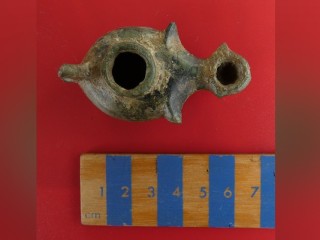- Archaeological News
-
 Image Credit: Elaine Vallack/Redesdale Archaeology Group
Image Credit: Elaine Vallack/Redesdale Archaeology Group
2000 Year Old Fruit Found at Roman Fort
Archaeologists at a Roman fort in northern England have uncovered an unusually well-preserved 2,000-year-old fruit, along with a remarkable collection of artifacts that shed new light on life at the ancient outpost. The discoveries were made at Bremenium Fort in High Rochester, located more than 20 miles north of Hadrian’s Wall, in what was once the northern frontier of Roman Britain.
According to Northumberland National Park, the excavation — completed in late October — produced more finds than any previous season. More than 70 volunteers and archaeology students assisted in the work, which revealed imported Roman pottery, including amphorae made in northern Spain likely used to transport olive oil. Other military-related discoveries included a spearhead, a lead sling bullet, and a rare votive oil lamp, in addition to brooches, lead seals, engraved gemstones known as intaglios, and several intact dolphin-shaped fittings.
Among these finds, the most surprising was a preserved plum, still recognizable after two millennia. Chris Jones, historic environment officer for the park, said the excavation was a unique opportunity for the public to connect with their shared heritage. He noted that each discovery provides insight into how people lived at the fort and the lasting mark they left on the landscape.
Excavation supervisor Bob Jackson of the Redesdale Archaeological Group described the assemblage as exceptional in both quantity and quality. The newly uncovered pottery, metalwork, and personal items have provided fresh information about trade networks, craftsmanship and daily life at Bremenium, an important northern outpost long before and after the construction of Hadrian’s Wall.
Northern England’s Roman frontier continues to yield remarkable treasures. Earlier this year, volunteers at Vindolanda found a carved depiction of a goddess, and another nearby excavation revealed two Roman shoes dating back 2,000 years.
Published on: 20-11-2025
Edited by: Abdulmnam Samakie
Source: Fox News